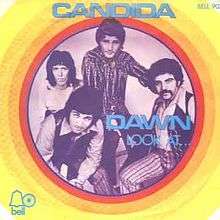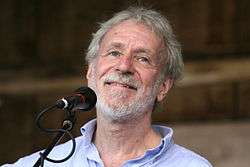Candida (song)
| "Candida" | ||||
|---|---|---|---|---|
 | ||||
| Single by Dawn | ||||
| from the album Candida | ||||
| B-side | "Look At..." | |||
| Released | July 1970 | |||
| Format | 7" single | |||
| Genre | Pop / Rock[1] | |||
| Length | 3:02 | |||
| Label | Bell Records | |||
| Writer(s) | Toni Wine and Irwin Levine | |||
| Producer(s) | Hank Medress and Dave Appell | |||
| Certification | Gold (RIAA) | |||
| Dawn singles chronology | ||||
| ||||
"Candida" was the first single released by the American pop music group Dawn, with vocals by Tony Orlando, in July 1970. The song, written by Irwin Levine and Toni Wine, was produced by Dave Appell and Hank Medress for Bell Records. Appell and Medress originally recorded another singer on the track, but decided that a different vocal approach would be preferable. Medress then approached Orlando to do the vocals. Orlando had been a professional singer in the early 1960s, but now worked as a music publishing manager for Columbia Records. Although initially worried about losing his job at Columbia, Orlando eventually agreed to lend his voice to the track.
"Candida" became a worldwide hit, reaching number one in five countries, and the top ten in many others. It was included on Dawn's debut LP in 1970 and later appeared on several compilation albums. Andy Williams, Jesse Winchester, Ray Conniff, and Bernd Spier are among the artists who have covered the song.
Background and recording
In 1970 Hank Medress of the Tokens and Dave Appell were producing a song called "Candida" for Bell Records.[2][3] The composition was written by Toni Wine and Irwin Levine.[3][4] For the first recording of the song, the lead vocal was done by blues singer Frankie Paris,[2] in a style reminiscent of the Drifters.[3] Paris's performance was deemed unsatisfactory, and a new singer was sought for the track.[2][3] Medress believed that "an ethnic feel" would suit the song well.[5] He asked his friend Tony Orlando, whose heritage is Puerto Rican and Greek, to perform its lead vocal.[3][6]
 |
"Candida"
|
| Problems playing this file? See media help. | |
Orlando, a former professional singer, had had two top-40 hits in the USA in 1961,[7] but later moved into the music publishing business; in 1967 Columbia Records chose him to manage their publishing division, April-Blackwood Music.[7][8] When Medress approached Orlando, he was reluctant to perform on a Bell Records single, as he did not want to jeopardize his job at Columbia.[2][5] Medress reassured him by saying they would use a band name for the release, and that nobody would know who the singer was.[2][5] Orlando finally agreed, partly because he believed the song would be unsuccessful and would not attract any attention.[9] He went into a studio with Appell and Medress, and sang his lead vocal over prerecorded tracks.[9] Background vocals were done by Wine and the Tokens' Jay Siegel;[2][3][10] Orlando was not present when these were recorded.[3] By different accounts, additional background singers may have included Ellie Greenwich,[3] Robin Grean,[3] Leslie Miller,[2] and Linda November.[10][a 1] Phil Margo and Siegel played instruments on at least one of the versions of the song.[2][3] The music of Orlando's version has been described as having "a lilting, sing-along groove".[7]
Release
"Candida" was released as a single in July 1970 under the moniker Dawn, named after the daughter of either Jay Siegel[6] or Bell Records executive Steve Wax.[4][3] The single reached number one in Brazil,[11] Malaysia,[12] Singapore,[13] Spain,[14] and Sweden,[15] and the top ten in Austria,[16] Canada,[17] Denmark,[15] Mexico,[14] New Zealand,[13] Norway,[4] South Africa,[13] the UK,[18] and the USA.[19] It also reached the top twenty in Australia,[3] Belgium,[20] and Germany.[21] Billboard ranked the record as the No. 18 song of 1970.[22]
Jay Warner, author of American Singing Groups: A History from 1940 to Today, notes that the group the Corporation released a different version of "Candida" around the same time as Dawn's.[3] The Corporation's recording was produced by Bill and Steve James, and released on Musicor Records.[3] Warner believes that this version was based on an early, slower piano-and-vocals demo by Toni Wine.[3] A July 1970 capsule review in Billboard magazine of both Dawn's and the Corporation's versions categorized the latter's recording as possessing "a strong blues and Tex-Mex flavor", and stated that both singles had "equal sales and chart potential".[23] However, although for a short while it seemed there might be competition between the two, the Corporation's single did not sell well.[3]
Dawn's version was released on their debut album, Candida, in 1970,[1] and later on the Dawn compilations Greatest Hits, The World of Tony Orlando & Dawn, The Definitive Collection, and The Big Hits.[24] It has also appeared on various-artists compilations including Today's Super Hits, AM Gold: 1970, and Real 70's: the Polyester Hits, Disc One.[25]
Covers

Numerous musicians have covered "Candida", among them Andy Williams,[26] Jesse Winchester,[27] Jimmy Velvet,[28] Ray Conniff,[29] and reggae artists Owen Gray[30] and the Pioneers.[31] Foreign-language versions have included recordings in Portuguese by the Fevers,[32] in Spanish by La Tropa Loca,[33] and in German by Bata Illic[34] and Bernd Spier.[35]
Chart performance
Weekly charts
|
Year-end charts
|
Notes
- ↑ Still other sources attribute the background vocals to Telma Hopkins and Joyce Vincent Wilson (see Hoffman 2004, p. 789; Bronson 2003; Ankeny), who were members of Dawn from some point in the early 1970s onwards (see Huey). However, in his autobiography, Orlando recounts recruiting Hopkins and Wilson for the group after "Candida" and its follow-up single, "Knock Three Times", were recorded and released (Orlando 2003, pp. 95–100).
Footnotes
- 1 2 Viglione
- 1 2 3 4 5 6 7 8 Childs 2011
- 1 2 3 4 5 6 7 8 9 10 11 12 13 14 15 16 17 Warner 2006, p. 484
- 1 2 3 4 Dawn – Candida (Norwegiancharts.com)
- 1 2 3 4 Orlando 2003, p. 91
- 1 2 Bronson 2003
- 1 2 3 4 Hoffman 2004, p. 789
- ↑ Ankeny
- 1 2 Orlando 2003, p. 92
- 1 2 Orlando 2003, p. 94
- 1 2 Hits of the World (1971-01-09), p. 48
- 1 2 Hits of the World (1970-12-05), p. 72
- 1 2 3 4 Hits of the World (1970-11-14), p. 53
- 1 2 3 Hits of the World (1971-03-13), p. 56
- 1 2 3 Hits of the World (1971-02-20), p. 52
- ↑ Hits of the World (1971-01-30), p. 56
- 1 2 Top Singles - Volume 14, No. 10, October 24, 1970
- 1 2 Singles: Candida
- 1 2 Hot 100, p. 90
- 1 2 Dawn – Candida (Ultratop)
- 1 2 Dawn – Candida (Charts.de)
- ↑ Billboard Year-End Hot 100 singles of 1970
- ↑ Top 60 Pop Spotlight, p. 80
- ↑ Tony Orlando: Discography
- ↑ Dawn Candida: Overview
- ↑ Haney
- ↑ Ruhlmann
- ↑ Jimmy Velvet Did You Know Elvis?: Overview
- ↑ Campbell
- ↑ Birchmeier
- ↑ Various Artists Roots, Rockers, Reggae, Vol. 3: Overview
- ↑ The Fevers Para Sempre: Overview
- ↑ La Tropa Loca 12 Exitos: Overview
- ↑ Bata Illic – Candida
- ↑ Bernd Spier – Candida
- ↑ "flavour of new zealand - search listener". Flavourofnz.co.nz. Retrieved 2016-10-03.
- ↑ Downey, Albert, and Hoffmann, p. 87
- ↑ "Item Display - RPM - Library and Archives Canada". collectionscanada.gc.ca.
- ↑ Musicoutfitters.com
- ↑ "Cash Box YE Pop Singles - 1970". Tropicalglen.com. 1970-12-26. Retrieved 2016-10-03.
References
- Ankeny, Jason. "Tony Orlando: Biography". Allmusic. Retrieved 2013-08-03.
- "Bata Illic – Candida". Germancharts.com. Retrieved 2012-09-27.
- "Bernd Spier – Candida". Germancharts.com. Retrieved 2012-09-27.
- Birchmeier, Jason. "Owen Gray Shook, Shimmy & Shake: The Anthology: Overview". Allmusic. Retrieved 2013-07-27.
- Bronson, Fred (2003). The Billboard Book of Number One Hits. Random House LLC. ISBN 9780823076772.
- Campbell, Al. "Ray Conniff We've Only Just Begun/Love Story: Overview". Allmusic. Retrieved 2013-07-27.
- Childs, Marti Smiley (2011). Echos of the Sixties. EditPros. ISBN 9781937317027.
- "Dawn – Candida". Charts.de. Retrieved 2012-09-20.
- "Dawn – Candida". Norwegiancharts.com. Retrieved 2012-09-20.
- "Dawn – Candida". Ultratop. Retrieved 2012-09-20.
- "Dawn Candida: Overview". Allmusic. Retrieved 2013-08-10.
- Downey, Pat; Albert, George; Hoffmann, Frank W (1994). Cash Box pop singles charts, 1950–1993. Libraries Unlimited. ISBN 978-1-56308-316-7.
- Haney, Shawn M. "Andy Williams Love Story: Overview". Allmusic. Retrieved 2013-07-27.
- "Hits of the World". Billboard. 1970-11-14. Retrieved 2013-07-26.
- "Hits of the World". Billboard. 1970-12-05. Retrieved 2013-07-26.
- "Hits of the World". Billboard. 1971-01-09. Retrieved 2013-07-26.
- "Hits of the World". Billboard. 1971-01-30. Retrieved 2013-08-10.
- "Hits of the World". Billboard. 1971-02-20. Retrieved 2013-07-26.
- "Hits of the World". Billboard. 1971-03-13. Retrieved 2013-07-26.
- Hoffman, Frank (2004). Encyclopedia of Recorded Sound, Volume 1. CRC Press. ISBN 9780203484272.
- "Hot 100". Billboard. 1970-10-10. Retrieved 2012-09-22.
- Huey, Steve. "Dawn: Biography". Allmusic. Retrieved 2013-08-03.
- "Jimmy Velvet Did You Know Elvis?: Overview". Allmusic. Retrieved 2013-07-27.
- "La Tropa Loca 12 Exitos: Overview". Allmusic. Retrieved 2013-07-27.
- Orlando, Tony, with Patsi Bale Cox (2003). Halfway to Paradise. Macmillan. ISBN 9780312319748.
- Ruhlmann, William. "Jesse Winchester A Touch on the Rainy Side: Overview". Allmusic. Retrieved 2013-07-27.
- "Singles: Candida". Theofficialcharts.com. Retrieved 2012-09-20.
- "The Fevers Para Sempre: Overview". Allmusic. Retrieved 2013-07-27.
- "Tony Orlando: Discography". TonyOrlando.com. Retrieved 2013-08-10.
- "Top Singles - Volume 14, No. 10, October 24, 1970". RPM. 1970-10-24. Retrieved 2012-09-20.
- "Top 60 Pop Spotlight". Billboard. 1970-07-11. Retrieved 2013-08-10.
- "Various Artists Roots, Rockers, Reggae, Vol. 3: Overview". Allmusic. Retrieved 2013-07-27.
- Viglione, Joe. "Dawn Candida: Overview". Allmusic. Retrieved 2013-08-03.
- Warner, Jay (2006). American Singing Groups: A History from 1940 to Today. Hal Leonard Corporation. ISBN 9780634099786.